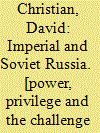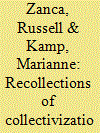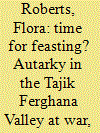| Srl | Item |
| 1 |
ID:
048616


|
|
|
|
|
| Publication |
Hampshire, macmillan Press, 1997.
|
| Description |
viii, 478p.Hbk
|
| Standard Number |
0333662938
|
|
|
|
|
|
|
|
|
|
|
|
Copies: C:1/I:0,R:0,Q:0
Circulation
| Accession# | Call# | Current Location | Status | Policy | Location |
| 040050 | 947.084/CHR 040050 | Main | On Shelf | General | |
|
|
|
|
| 2 |
ID:
152008


|
|
|
|
|
| Summary/Abstract |
Collectivization of agriculture in Uzbekistan demanded the efforts of many local agitators who called on Uzbek dehqons to join kolkhozes, and who stimulated a local version of class warfare. In oral history interviews with those who experienced mass collectivization’s first moments, we find both the brutality of change imposed from above and a social transformation led by local Uzbek activists. We argue that Uzbek agitators allowed many dehqons to identify with this project to change rural land ownership, and that their offers of tangible benefits, such as advance payments for cotton crops and distribution of food, provided strong incentives for joining. Class rhetoric was important as activists divided the poor from the kulak and used threats of dekulakization, as well as incentives, to promote rapid collectivization.
|
|
|
|
|
|
|
|
|
|
|
|
|
|
|
|
| 3 |
ID:
152007


|
|
|
|
|
| Summary/Abstract |
The well-established narrative of the Soviet Union’s victory in the Great Patriotic War emphasizes the enormous sacrifices that it entailed, and the extraordinary sufferings of both the Red Army and the entire civilian population. Throughout the war years, however, reports of lavish feasting and conspicuous consumption taking place on collective farms in northern Tajikistan continued to be submitted to Moscow. The ‘culprits’ were usually local Soviet officials, who appear to have reverted to traditional redistributive practices and modes of patronage. I argue that such acts of ‘anti-Soviet sabotage’ do not necessarily prove that Central Asians understood themselves as colonized subjects making the most of a temporary reprieve from state intrusion. The war in fact casts into sharp relief the extent to which many local officials of the Tajik SSR perceived themselves as loyal Soviet citizens – and as good Muslims, too.
|
|
|
|
|
|
|
|
|
|
|
|
|
|
|
|